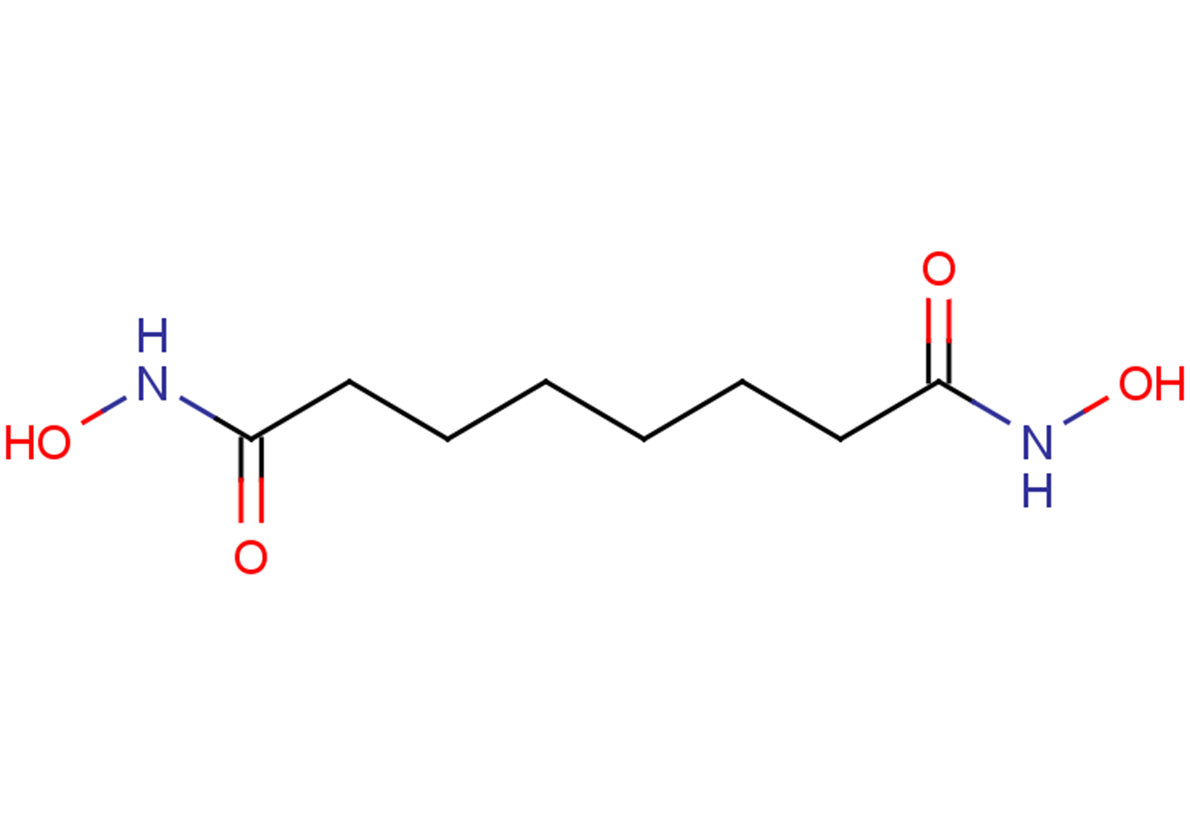
SBHA
CAS No. 38937-66-5
SBHA( Suberohydroxamic acid | Suberoyl bis-hydroxamic acid )
Catalog No. M24349 CAS No. 38937-66-5
SBHA (suberohydroxamic acid) is a Histone deacetylase (HDAC) inhibitor. HDAC is required for transcriptional modulation, cell cycle regulation and development.
Purity : >98% (HPLC)
 COA
COA
 Datasheet
Datasheet
 HNMR
HNMR
 HPLC
HPLC
 MSDS
MSDS
 Handing Instructions
Handing Instructions
| Size | Price / USD | Stock | Quantity |
| 100MG | 27 | In Stock |


|
| 200MG | Get Quote | In Stock |


|
| 500MG | Get Quote | In Stock |


|
| 1G | Get Quote | In Stock |


|
Biological Information
-
Product NameSBHA
-
NoteResearch use only, not for human use.
-
Brief DescriptionSBHA (suberohydroxamic acid) is a Histone deacetylase (HDAC) inhibitor. HDAC is required for transcriptional modulation, cell cycle regulation and development.
-
DescriptionSBHA (suberohydroxamic acid) is a Histone deacetylase (HDAC) inhibitor. HDAC is required for transcriptional modulation, cell cycle regulation and development. It is an enzyme that deacetylates lysine residues on the N-terminal of the core histones.
-
In VitroSuberoyl bis-hydroxamic acid (10, 20 or 50 μM; 24 hours) combination with TRAIL improves apoptosis extent, and when TRAIL is combined with 20 μM SBHA (itself causing only 10–15% apoptosis), resulting in 45–50% cell death.Suberoyl bis-hydroxamic acid (20-50 μM; 10-20 hours) alone has little effect on the expression of the proteins Bcl-xL, Mcl-1, and has albeit mildeffect on Bax. When it combines with TRAIL,which increases the ratio of relative protein expression of Bcl-xL and Bax in early periods, while the change in the ratio of Mcl-1 and Bax increases later in MM-BI and Ist-Mes2 cells.Suberoyl bis-hydroxamic acid (30 μM; 6 hours) causes accumulation of acetylated histone H4 in MEL cells. Apoptosis Analysis Cell Line:MM-BI and Ist-Mes2 cells Concentration:10 μM, 20 μM or 50 μM Incubation Time:24 hours Result:Showed a cooperative effect in cell apoptosis.
-
In VivoSuberoyl bis-hydroxamic acid (intraperitoneal injection; 200 mg/kg; every 2 days; 12 days) reveals a marked increase in the active form of Notch1(NICD) with a concomitant decrease in ASCL1. It reduces the MTC tumor growth. Animal Model:Nude mice injected with human MTC cells Dosage:200 mg/kg Administration:Intraperitoneal injection; every 2 days; 12 days Result:Resulted in an average 55% inhibition of tumor growth in SBHA treatment group.
-
SynonymsSuberohydroxamic acid | Suberoyl bis-hydroxamic acid
-
PathwayCell Cycle/DNA Damage
-
TargetHDAC
-
RecptorHDAC1| HDAC3
-
Research Area——
-
Indication——
Chemical Information
-
CAS Number38937-66-5
-
Formula Weight204.22
-
Molecular FormulaC8H16N2O4
-
Purity>98% (HPLC)
-
SolubilityDMSO : 49 mg/mL (239.93 mM; Need ultrasonic); H2O : 8.16 mg/mL (40 mM; Need ultrasonic)
-
SMILESONC(CCCCCCC(NO)=O)=O
-
Chemical Name——
Shipping & Storage Information
-
Storage(-20℃)
-
ShippingWith Ice Pack
-
Stability≥ 2 years
Reference
1.Richon VM, Emiliani S, Verdin E et al. A class of hybrid polar inducers of transformed cell differentiation inhibits histone deacetylases. Proc Natl Acad Sci U S A. 1998 Mar 17; 95(6):3003-7.
molnova catalog



related products
-
SKLB-23bb
SKLB-23bb is an orally bioavailable HDAC6-selective inhibitor and also has microtubule-disrupting ability.
-
Tasquinimod
An orally active antiangiogenic agent with anti-prostate cancer activity, an allosteric modulator of HDAC4 with Kd of 10-30 nM.
-
Rocilinostat
Rocilinostat (ACY-1215) is a selective HDAC6 inhibitor with IC50 of 5 nM in a cell-free assay.



 Cart
Cart
 sales@molnova.com
sales@molnova.com


